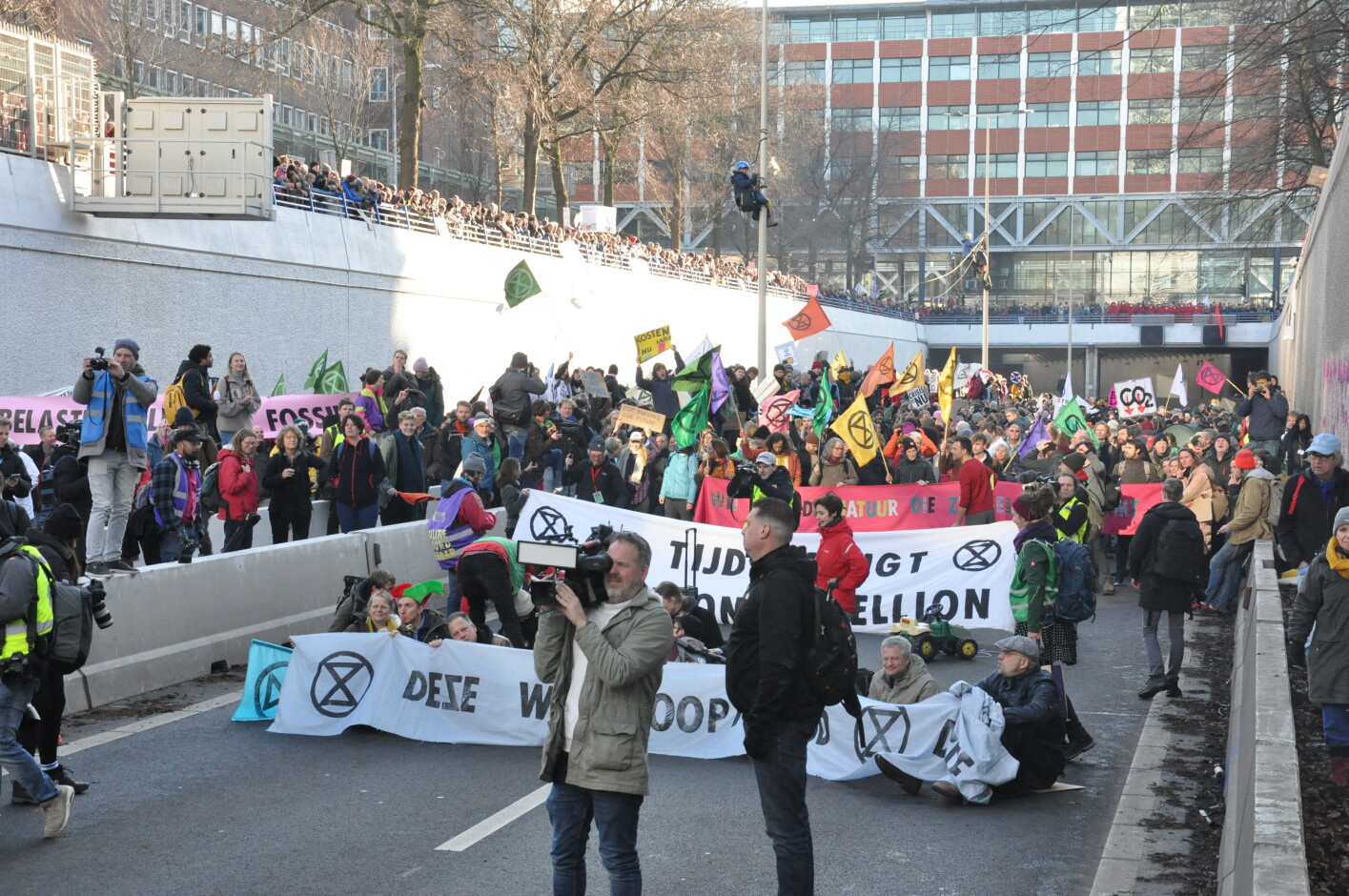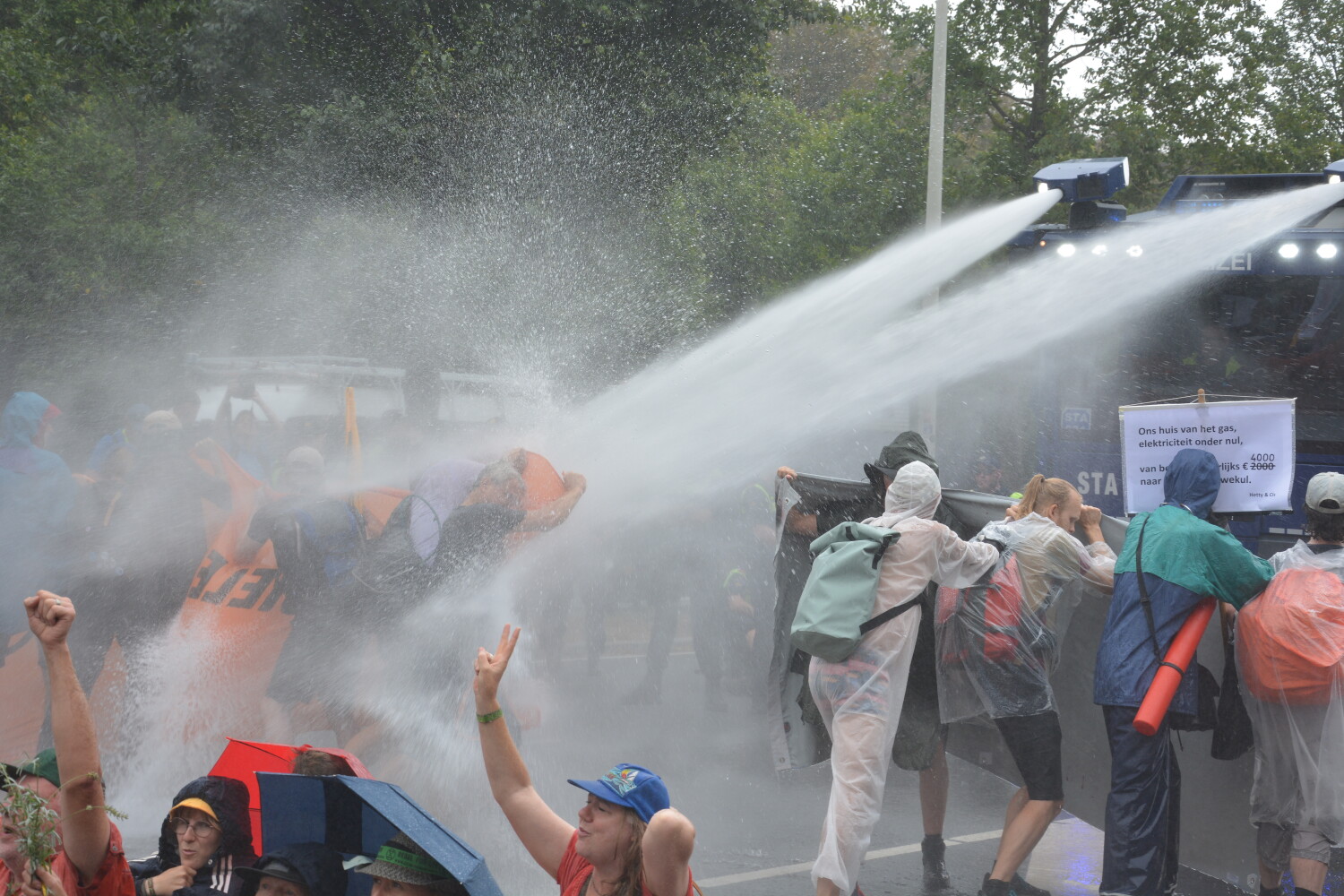
January the 28th, 2023. I am walking through a tunnel in The Hague, with a large crowd. It is the first ever civil disobedient climate protest I ever went to. The demand: end subsidies on fossil fuels. When the tunnel roof becomes open, we arrive at the location: between the temporary parliament and the Ministry of Economic Affairs and Climate. I walked away when the police said what I was doing was not allowed, but 768 others got arrested. I do not want to glorify being arrested, if you do not get arrested you can still be a really useful activist, but I include the numbers here to give you an idea of the growth of the protests.
It was the last time I ever went to that place. Every few months or so this would happen. The next time, on March the 11th, the police blocked the tunnel and brought in ze Wasserwerfer 10000 watercannon from Germany(the dutch ones are broken). I was shocked. Were they really going to use this against peaceful protesters? It was cold during the evening. Some people got hypothermia. The police were smart, and they designed carts to put people on so they don't have to carry them.
On May 27th there was the next one, and it was again much bigger that the one before: 1579 people got arrested. The water cannons were there too.
Starting from 9th of September, the A12 blockade is taking place at noon every day. That day there were more than 2400 arrests. I was there on the 11th of September, and it almost seemed like a routine, for both police and the activists. Watercannon sprays people wet. I don't see it's utility in this case, it just seems to annoy the protesters, but it isn't moving them.
This more or less went on for 2 and a half weeks. Usually arrests were in the hundreds. Sometimes there was a watercannon. One time they had a new one from Belgium which they put on the hard spray causing injuries, some days the watercannon wasn't there. Over time, the police seemed to become quicker and quicker with the clearance of the road, like an any% speedrun. Police violence seemed to vary over time, but I feel like it's more than before September the 9th. Last Tuesday, it took no more than half an hour to clear the road, as opposed to hours. They tried other ways to prevent the blockade, such as not closing the road themselves, or forming a loose police line, which proved ineffective as the bulk of the activists just walk through.
Until Wednesday the 27th, when something strange happened. There was barely any police at all. So they just walked into the tunnel, the first time since January the 28th this year. I was perplexed when I watched the livestream, audibly saying "what the fuck", after which concerned people approached me to ask if I was OK. A few hours later, the police showed up and removed the protesters. The same thing happened Thursday and Friday.
Yesterday and today though, another meta shift: the police was suddenly present again much like the time before that, they used the water cannon briefly on Saturday.
One difference with groups such as the German Letzte Generation or British Just Stop Oil is that Extinction Rebellion NL doesn't really block roads that much on other places. Aside for occasionally blocking a road to some polluting industry, or kicking off a campaign, to my knowledge XR only really blocked the A12 road this year. And they always block the A12 with a large group, think of at least 100 people so far.
The mayor of The Hague doesn't really like these protests. Up until March the 11th, protesters were arrested and detained for a few hours, later set free during the night. But since may the 27th, the public prosecutor has stopped doing this. They arrest people, to immediately set them free at a different location.
According to the public prosecutor, it doesn't really make sense to try to prosecute them, as the judges in trial often don't give any additional punishment.OM I also reckon it saves them a LOT of time and working hours, on an already apparatus of which its capacity is under strain.

Now that the road is blocked every day, the mayor of The Hague asked the public prosecutor to register the activists, to see who is doing it often. Seemingly to his annoyance the attempt to this "has failed", he said in a council meeting on Wednesday, the same day that there was no police in the beginning of the blockade. Indeed, when I was "arrested" yesterday, the police didn't even say I was arrested, guided me to a bus, the bus brought me somewhere, and then I was let go. They didn't check anyone's ID.
I reckon it's just too many people. In the same meeting he said "The limit has been reached. I have to close police stations. The continuity of police work is under pressure".omroep west A chairman from a police union said that the police deployment is worth 1 million euro every day.omroep west
Watching the council meeting, it seems that the mayor is really frustrated. It gives of a vibe of powerlessness. That he tries to prevent these blockades, or try to deter activists, but is unable to.
And I feel that is a bit ironic. To me it seems the whole reason that people went on to protest on this road is powerlessness. There have been marches, petitions, lobbying, sending letters, campaigning; all to no avail. A group of people is so pissed, seeing a bleak future, that they decide to block roads like this.
These protests know no winners, only losers. The only good way to end this in a satisfying way for everyone is to stop fossil subsidies. It's that simple, yet exactly that seems hard.
Also, not every mayor acts like this. The mayor of Rotterdam allowed a road blockade on the famous Erasmusbrug: "A protest may have impact on the traffic situation in a city, which may induce traffic hinder. But since the impact of the protest during the day was limited, two other bridges(? cannot translate properly, a connection between two river banks) were still available and the traffic safety wasn't impaired, I did not have any reason to limit this protest on the basis of traffic safety."
The mayor of The Hague could do this as well. The road was closed for 5 months due to construction in 2022.
I am curious how long the daily blockades will last. We have had an exceptional warm September(how fitting...), but winter is approaching. And when there is water cannon there, that can become really dangerous. Will there be more repression? Will there be no repression at all? The meta will develop. Water cannons were once a huge surprise, now they are normal. My fear is just that it dies out, and that the (media) attention will decrease, and that nothing will change.
I see signs of media fatigue. Climate activists have to constantly adapt new strategies. In 2022 the meta was throwing soup cans on paintings, now that strategy seems dead. Do protests like this work at all? Though it must be said, the A12 blockades have put attention on fossil subsidies in the public discussion.
But yeah. Interesting times. Nobody knows how this will develop. Whatever happens, I am glad there is a growing amount of people who are demanding the much needed climate action.